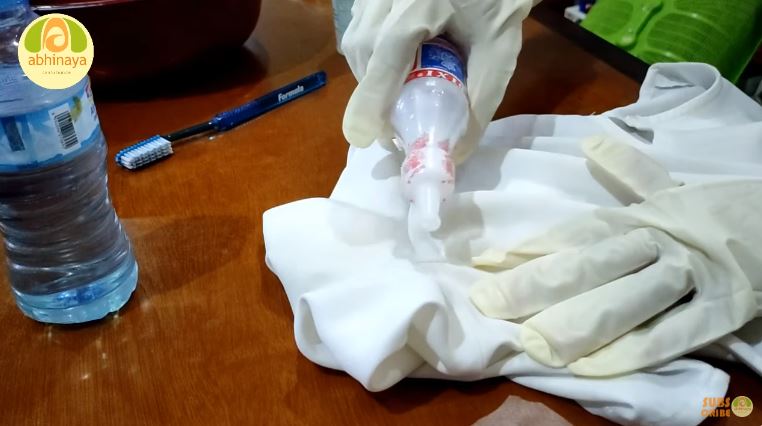foto: YouTube/mufis official
Brilio.net - Deodorants are usually used to treat body odor problems. However, after use, the deodorant stains become annoying. The reason is, when the deodorant content mixes with sweat, yellowish stains will appear on the clothes. If this happens, yellowish stains will be clearly visible in the armpits of the clothes.
Unfortunately, removing stains from the armpits of clothes is a difficult job. Even though it has been brushed repeatedly, the stains are still clearly visible. If it's like this, your confidence in wearing clothes will decrease, right?
To wash their clothes, some people immediately brush their armpits with bleach. After brushing for a while, the yellow stains in the armpits of the clothes became faint and even disappeared. If this is the case, just wash the clothes with detergent as usual.
But there's no need to worry if the stock of bleach runs out at home, because there are other ingredients that can be used to clean deodorant stains on the armpits of clothes. The method was demonstrated by YouTube user Bantu Bunda. In his video upload, this netizen appears to have replaced the bleach with two kitchen ingredients.
How to clean deodorant stains on the armpits of clothes using kitchen ingredients.
Reported by BrilioFood from YouTube Help Mother on Friday (3/5), the two kitchen ingredients used were dish washing soap and table vinegar. To do this, pour enough table vinegar into the armpits of your clothes. To absorb it completely, let it sit under the clothes for a few moments.

photo: YouTube/Bantu Bunda
After leaving it for a while, add dish soap to the underarm area of the clothes. Then immediately brush the underarms of the clothes using an old toothbrush. Occasionally you can dip your clothes in water and then rub them again. After rubbing several times, the yellowish stains in the armpits of the clothes faded.

photo: YouTube/Bantu Bunda
When the clothes are clean, you can wash them immediately using detergent as usual. After that, rinse the clothes with normal water. The result is that the clothes are clean again as before, with no more yellow stains remaining in the armpits of the clothes.

photo: YouTube/Bantu Bunda
Can table vinegar cause an explosion?
Table vinegar usually does not cause an explosion on its own. However, if table vinegar is mixed with certain ingredients, such as hydrogen peroxide or baking soda, the chemical reaction that occurs can cause an increase in pressure or the formation of gas strong enough to cause a small explosion. Therefore, it is important to always be careful and follow the instructions for use when using chemicals at home.
How to store opened table vinegar so that it lasts a long time.To store opened table vinegar so that it remains durable and long-lasting, follow these steps:
1. Use an airtight container.
Transfer the vinegar to an airtight container after opening it. Make sure the container is clean and dry before adding the vinegar.
2. Store in a cool and dark place.
Place the vinegar container in a cool, dark place, such as a cupboard or refrigerator. Avoid storing vinegar in a place exposed to direct sunlight or too high a temperature, because this can speed up the oxidation and decomposition process.
3. Keep the container clean.
Make sure the vinegar container remains clean and dry every time it is used. Avoid touching the mouth of the container with dirty hands or tools, as this can contaminate the vinegar and speed up its deterioration.
4. Close tightly after use.
After use, make sure to close the vinegar container tightly. This will help prevent air and moisture from entering the container, which can speed up the vinegar's oxidation and breakdown process.
5. Avoid contamination.
Use a clean spoon or liquid scoop every time you take the vinegar out of the container. Avoid pouring vinegar directly from the bottle onto food or drinks to avoid contamination.
With the methods above, you can store open table vinegar well and extend its life. Always check the vinegar for aroma and appearance before use, and discard it if there are signs of damage or contamination.
(brl/tin)